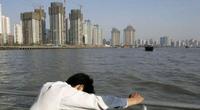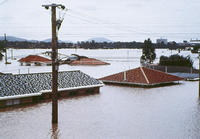-
U.K. report warns of coming global food shortages
By 2050 global food supplies will not be sufficient to feed an expanding population; the UN estimates that food production must rise by 70 percent to feed a world population of more than nine billion in 2050; rising demand and surging global population coupled with increasing resource conflicts over land, water, and energy will hamper food production; currently nearly a billion suffer from hunger and more than sixty food riots have occurred in more than thirty countries in the last several years; the report urges an immediate action and whole range of government solutions to adjust current policies on economics, climate change, resource use, and agricultural practices
-
-
Dinosaurs survived mass extinction by 700,000 years
The long established impact theory of dinosaur extinction holds that the age of dinosaurs ended between 65.5 and 66 million years ago, after Earth was hit by an asteroid; the impact caused massive fires, throwing smoke and soot into the atmosphere, blocking sun light for months, and causing the death of plants on which the vegetarian dinosaurs depended; a femur bone of a hadrosaur found in New Mexico is only 64.8 million years old, meaning this particular plant eater was alive about 700,000 years after the mass extinction event
-
-
Expert: Czech Republic beginning to run out of water
The Czech Republic is running low on its underground water supplies, with villages in the north and the south experiencing shortages; nearly 50 percent of Czech residents depend on underground water sources; experts believe that increasingly extreme weather patterns caused by climate change are to blame; long dry months followed by severe storms are causing massive floods and leave the ground less able to absorb water; extreme estimates predict that by 2050, the Czech Republic would not have enough water for its population’s basic needs
-
-
Scientist tackles China's "sinking cities" problem

A University of Nottingham researcher has been awarded funding to help China prevent human disaster as some of its fastest-growing cities sink under the weight of towering skyscrapers; one example: Shanghai, one of the most densely-populated cities in the world, is sinking at an average rate of between two centimeters to four centimeters a year, putting pressure on underground pedestrian and railway tunnels and building foundations
-
-
New York State prepares for sea level rise
More than 62 percent of New York State’s population lives in marine coastal counties; sea level in the Lower Hudson Valley and Long Island is projected to rise two to five inches by the 2020s, increasing 12 to 23 inches by the end of the century (up to 55 inches by the end of the century if accelerated polar ice melt occurs); New York Harbor has already experienced an increase in sea level of more than 15 inches in the past 150 years, with harbor tide gauges showing a rise of between four and six inches since 1960
-
-
Rising sea waters threaten North Carolina's delicate coastline
A North Carolina science panel is predicting the sea level will rise by one meter by 2100; this means about 2,000 square miles of coastline that is a meter or less above water is at risk; on that land is some of the state’s most expensive real estate that economists say is worth a total of almost $7 billion
-
-
Fox shoots man
A hunter in Belarus shot a fox then tried to kill it with the butt of the rifle; the injured fox resisted, and in the process pulled the trigger on the hunter’s gun, allowing the animal to run off and sending the unnamed man to the hospital with a leg wound
-
-
U.S. lacks infrastructure to increase use of ethanol fuel
Scientists at Purdue University say the United States lacks the infrastructure to meet the federal Renewable Fuel Standard with ethanol; researchers say the United States has hit the “blending wall” and lacks the ability to consume more ethanol than what is currently produced; less than 3 percent of vehicles on the road are equipped to handle ethanol fuels and there are only 2,000 pumps; the federal Renewable Fuel Standard requires nearly three times as much renewable fuel to be produced per year by 2022
-
-
Brisbane under water

Brisbane, a city of two million and Australia’s third largest, is flooded; roads are inundated, railway lines have been cut, and sewage is spreading into the waters; dozens of suburbs are under three meters of waters, with some factories and homes only visible by their roofs; more than 100,000 properties had their power cut as a precaution against flooding of electricity substations; the worst affected area was the town of Toowoomba, west of Brisbane, where residents described an 8-meter “instant inland tsunami” ripping through the streets on Monday; the flood zone in northern Australia now covers are larger than Germany and France combined
-
-
World Bank: Coastal cities in Asia face devastating floods
Thirteen of the twenty largest cities in the world are located on the coast, with more than a third of the world’s population living within 100 miles of a shoreline; a World Bank report finds that Asia’s major coastal cities will experience more devastating floods; damage due to flooding could be as high as 6 percent of regional GDP in 2050; developing cities will be most heavily affected; the report urges the threatened cities immediately to begin developing and implementing long-term plans to harden critical infrastructure to withstand and mitigate the effects of increased flooding
-
-
New spacecraft to help break the climate debate gridlock
NASA plans to settle the climate debate with a fleet of Earth-orbiting spacecraft keeping tabs on the planet’s changing climate; the fleet has two tasks: first: take the total amount of energy coming to Earth from the sun, subtract what gets reflected back or re-radiated from particles in the atmosphere, and see what you have left; if more energy is coming in than going out, it is getting hotter; second: figure out what fraction of these atmospheric particles stems from natural phenomena, such as wind-blown dust and volcanic eruptions, and what is coming from things we can control — our industrial processes, business pursuits, and recreational pass-times
-
-
Pentagon prohibited from purchasing Chinese solar panels
Obama signs military appropriations bill that prohibits the Pentagon from purchasing Chinese solar panels; the “Buy American” provision is part of a larger trade dispute with China over subsidies; the Pentagon is investing heavily in solar to reduce its energy consumption and increase fighting effectiveness; the bill is likely to raise costs for the military
-
-
Day of drinking recycled water nears
Aussie researchers show that storm water collected from the aquifer into which urban water flows, after undergoing treatment, had dramatically lower levels of all hazards and contaminants; further supplemental treatment was needed to remove some hazards, though the process shows potential if improvements are made
-
-
Taiwan wants pigs potty-trained to curb pollution
The Taiwanese government reports that experiments in potty-training pigs proved successful: a breeder of 10,000 pigs has established special pig “toilets” on the farm; the toilets were smeared with feces and urine to attract the pigs; within weeks, 95 percent of all pig waste was collected in the toilets, making the farm — as well as nearby rivers and fields — much cleaner; additional benefits: the cleaner farm helped reduce illness among the pigs and boosted their fertility by 20 percent
-
-
China may need 300 years to reverse desertification
Huge population pressures, scarce rainfall, and climate change have made China the world’s biggest victim of desertification, a problem that could take 300 years to reverse at the current rate of desertification reversing; 27 percent of China’s total land mass, or about 2.6 million square kilometers (1.04 million square miles), are considered desertified land, while another 18 percent of the nation’s land is eroded by sand
-
- All
- Regional
- Water
- Biometrics
- Borders/Immig
- Business
- Cybersecurity
- Detection
- Disasters
- Government
- Infrastructure
- International
- Public health
- Public Safety
- Communication interoperabillity
- Emergency services
- Emergency medical services
- Fire
- First response
- IEDs
- Law Enforcement
- Law Enforcement Technology
- Military technology
- Nonlethal weapons
- Nuclear weapons
- Personal protection equipment
- Police
- Notification /alert systems
- Situational awareness
- Weapons systems
- Sci-Tech
- Sector Reports
- Surveillance
- Transportation
Advertising & Marketing: advertise@newswirepubs.com
Editorial: editor@newswirepubs.com
General: info@newswirepubs.com
2010-2011 © News Wire Publications, LLC News Wire Publications, LLC
220 Old Country Road | Suite 200 | Mineola | New York | 11501
Permissions and Policies
Editorial: editor@newswirepubs.com
General: info@newswirepubs.com
2010-2011 © News Wire Publications, LLC News Wire Publications, LLC
220 Old Country Road | Suite 200 | Mineola | New York | 11501
Permissions and Policies
